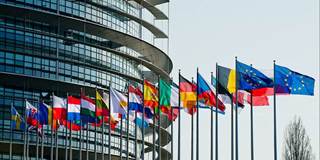This month's European Parliament election marks a small but significant step in the emergence of a transnational political space – a first in European and world history. But, if the European Council fails to respect the results of the public campaign in selecting the European Commission's president, progress could be stifled.
WASHINGTON, DC – This month, European citizens will head to the polls to select the 751 members of the European Parliament to represent 507 million people. The way the election campaign has unfolded marks a small but significant step in the emergence of the first transnational political space in European – indeed, world – history.
To be sure, the European Parliament elections have been bringing smaller shares of voters to the polls: 43% in 2009, compared to almost 60% in 1978-1994. Nonetheless, the participation rate over the last decade is comparable to average turnout in American congressional elections. Given the perceived remoteness of the European parliament and widespread frustration with the European Union’s bureaucracy, the level of participation and the movement toward transnational politics is remarkable.
The transnational nature of the election is stronger this time because the major pan-European political parties have, for the first time, nominated specific candidates for the presidency of the European Commission, and the candidates are campaigning, including in televised debates. The European Council, as mandated by the Lisbon Treaty, will have to take into account the election results in selecting the candidate to put forward for parliamentary endorsement.

WASHINGTON, DC – This month, European citizens will head to the polls to select the 751 members of the European Parliament to represent 507 million people. The way the election campaign has unfolded marks a small but significant step in the emergence of the first transnational political space in European – indeed, world – history.
To be sure, the European Parliament elections have been bringing smaller shares of voters to the polls: 43% in 2009, compared to almost 60% in 1978-1994. Nonetheless, the participation rate over the last decade is comparable to average turnout in American congressional elections. Given the perceived remoteness of the European parliament and widespread frustration with the European Union’s bureaucracy, the level of participation and the movement toward transnational politics is remarkable.
The transnational nature of the election is stronger this time because the major pan-European political parties have, for the first time, nominated specific candidates for the presidency of the European Commission, and the candidates are campaigning, including in televised debates. The European Council, as mandated by the Lisbon Treaty, will have to take into account the election results in selecting the candidate to put forward for parliamentary endorsement.